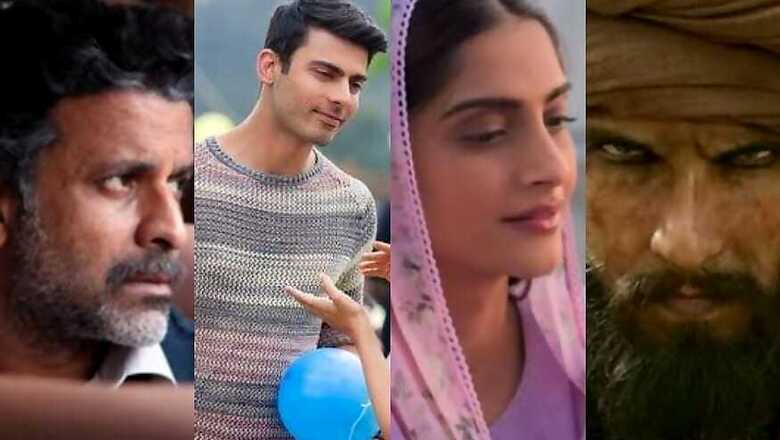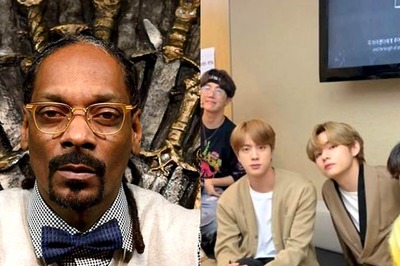
views
In 2019, Bollywood produced its first lesbian 'romance' with Sonam Kapoor starrer Ek Ladki Ko Dekha Toh Aisa Laga. Of course, this wasn't the first time that a lesbian relationship was shown on Indian screens, but it was definitely the first time it got the quintessential Yash Chopra romance treatment with the sarson ke khet ka wide shots, Punjabi wedding and naach-gaana, a forbidden courtship, familial opposition to the relationship, as well as a metaphorical 'ja simran, ji le apni zindagi' moment, all of which was, until this year, reserved for boy-meets-girl love stories.
Read: Fleabag to Mrs Maisel to Typewriter: Here are Our Favourite Web Shows of 2019
Over the decades Bollywood has moved at a glacial pace as far as tackling issues of gender and sexuality on screen is concerned. Kisses were hidden behind flowers delicately brushing one another, love scenes were always implied, and rarely explicitly shown, and lead characters seldom broke gender stereotypes. Homosexual and transgender characters were handed out the rawest deal of all. For starters, such characters had very limited representation in mainstream Bollywood films and even when they were depicted, it was either for comic relief -- with lead characters often humiliating them for their orientation to draw cheap laughs from the audience -- or worse still, they were portrayed as pure evil.
In 2010s, however, things changed considerably. Lead actors like Fawad Khan, Sonam Kapoor, Manoj Bajpai, Madhuri Dixit, and Huma Qureshi played LGBTQ+ roles with grace and sensitivity onscreen. During this decade Bollywood embraced the rainbow flag in its own way, and that too much before the arrival of the watershed moment of decriminalisation of consensual same-sex relationship in reality on 6 September 2018 with the Supreme Court verdict.
Ek Ladki Ko Dekha Toh Aisa Laga released within six months of that verdict. A particularly meta moment in that film is when a play within the film which also has a lesbian romance at its core is being staged at a small town in Punjab. While some in the audience of the play walk-off in indignation for being subjected to watch such 'perversion', others get teary-eyed as the love story touches their hearts. Many just sit back and enjoy the play, because it has an engaging story. It is a wonderful commentary on how despite the legal sanction that the supreme court has granted, it may take a while to change societal mindsets completely.
In 2010s Bollywood gave us gay, lesbian, bisexual and transgender characters who were not defined by their orientation alone. In Margarita With A Straw (2015) Kalki Koechlin's character Laila is spunky, smart, fun and wheelchair-bound, as she suffers from cerebral palsy. But, the director of the film, Shonali Bose, never allows her disability or sexual orientation to be her primary defining characteristics. When we first meet Laila, she is crushing hard on a hunky dude, but later in the film, when in New York she meets Khanum (Sayani Gupta) and is attracted to her. There are no moments of dramatic epiphanies about her orientation, just a matter-of-factly acceptance of feelings and emotions. Margarita With A Straw is also refreshingly liberal in depicting female sexuality --- be it Laila's vibrator shopping or the scene where she masturbates.
Although far less bold an attempt, another lesbian relationship onscreen that was poetically conveyed was between Madhuri Dixit (Begum Para) and Huma Qureshi (Muniya) in Abhishek Chaubey's Dedh Ishqiya (2014). There is a scene in the film, which is a nod to Ismat Chughtai's Lihaaf, where shadow play is used to depict the intimacy of the two female characters. The film unveils the lesbian relationship with a lot of symbolism, may be because it released years before the SC verdict. In fact, a dialogue by Naseeruddin Shah's character, ' Lihaaf maang le..." to Begum Para, and Muniya also alludes to the short story that Chughtai wrote on lesbian love.
2010s had been a defining decade in the portrayal of lesbian loves onscreen, especially because before this decade, either lesbian romances were made with raunchy scenes so as to be a vehicle to fulfil male fantasies like Girlfriend (2004), or such relationships were shown to blossom in women-only spaces like a mahila ashram in Subah (1981) and often among two women, who were rejected by men like in Deepa Mehta's critically acclaimed film Fire (1996). But, in films like Ek Ladki Ko Dekha toh Aisa Laga, Margarita With A Straw or Dedh Ishqiya, we saw women characters CHOOSE women as their partners because they fall for them.
Apart from Dedh Ishqiya, another recent film, which was a box office blockbuster that also alluded to, and did not explicitly portray a homosexual relationship was Padmaavat (2018) in which Ranveer Singh's Alauddin Khiji and Jim Sarbh's Malik Kafur are inexplicably drawn towards one another. There is a raw sexual magnetism between the two whenever they are in scenes together, and Kafur expresses a fit of explicit jealousy towards women Khilji beds. There are moments of the two together in the bed, and while a lot chest heaving and testosterone pervade these intimate scenes, Sanjay Leela Bhansali never gives a clear indication of what is the nature of it and leaves it open for audience's interpretation.
However, the two films in this decade with gay lead characters, which can be applauded for making such movies a part of Bollywood's mainstream are Kapoor and Sons (2016), and Aligarh (2015).
Ironically, Kapoor and Sons was produced by Karan Johar who despite being gay himself, had throughout the 2000s made successful Bollywood films in which homosexuality was parodied and made fun of like in Kal Ho Na Ho (2003), and Dostana (2008). This continued well into this decade with Student of the Year (2012) much to the chagrin of the LGBTQA+ community but the filmmaker turned a new leaf with a sensitive, heart-warming gay romance in Bombay Talkies (2013).
Kapoor and Sons (2016), directed by Shakun Batra, depicts a dysfunctional family reunited after the grandfather(Rishi Kapoor's) suffers a heart attack. The oldest son of the household Rahul, (Fawad Khan), the perfect bachcha of his mother, Sunita (Ratna Pattak) struggles to come out to his family members. One of the most brilliant things about this movie is that it avoided the use of labels like 'gay' or 'homosexual' and Khan's Rahul was a far cry from the caricaturish, stereotypical effeminate gay men, that Bollywood has been peddling for long. For starer, his name is Rahul, the name that most romantic heroes of Bollywood are bestowed with and he looks like Fawad Khan. Batra layers Khan's character with emotional complexities, and more importantly, he keeps it real. Rahul, like many Indian men who find it hard to come out to their families, makes up the story of a relationship with a foreigner girl to tell his mother, just so that she doesn't suspect anything. His mother, Sunita, on the other hand, denotes many such liberal Indian moms, who, despite their liberalness find it hard to accept the fact that their own son is gay. This film, with three very good looking people in lead roles (Fawad Khan, Alia Bhatt, and Siddharth Malhotra), drew many to the cinemas and was definitely a conversation starter for LGBTQA+ rights movement.
Aligarh (2015), on the other hand, starring Manoj Bajpai was critics' favourite. It was perhaps the first movie which gave us a glimpse of what it is really like to be a gay man, in a small town -- the kind of persecution, alienation and even abuse one faces for being gay. Unlike Fawad Khan's Rahul who is good looking, confident and suave Bajpai's SR Siras is an ageing Marathi professor in the conservative town of Aligarh, who is so meek and gentle that it appears that he is almost always apologetic for his existence.
His life unravels after he is discovered having sex with a rickshaw puller in his own house, by his prying neighbours. No one cares that it is the neighbours who are guilty of invading his privacy and Siras is the one who is punished. He is thrown out of the university and his landlord evicts him for his homosexuality. Bajpai, with his exquisite performance, creates a soulful and aching gay man, who suffers from lovelessness, and loneliness. The film which is muted, and meditative, don't preach for a second, but through the brilliant portrait of Siras it chalks out all the ways, in which members of the LGBTQA+ community have been discriminated against for decades. It's most heartbreaking moment is when Siras is asked if he is gay to which he replies, "Koi mere feeling ko teen aksharo mein kaise samajh sakta hai."
Another such beautifully written gay character that we saw on the small screen in this decade, was in Amazon Prime's series, Made In Heaven. The character of Karan Mehra (Arjun Mathur) is urban, outgoing, and openly gay to everyone else, apart from his family. He is sexually liberated and navigates the upper-class gay circles with ease and casually engages in one night stands. To him, who lives a life of privilege, in a metro city (unlike that of Siras who lived in a small town like Aligarh) his homosexuality is not an issue, as it wouldn't be in most western countries, where gay sex is legal. But, he and the audiences are in for a rude awakening, when he too, much like Siras, is filmed by his neighbour (who is also his landlord) and is subsequently arrested by police. He faces extreme physical and sexual assault for being gay as the series advances, making us realise that before SC struck down 377, how little it took, for big liberal metro city spaces to become as discriminatory, and conservative, as small towns and villages when it came to homosexuality.
The small screen in fact also gave us a gorgeous transgender character with Cuckoo (Kubbra Sait), from Netflix's series, Sacred Games. The first time Gaitonde (Nawazuddin Siddiqui) sets his eyes on her, she is seen descending from a rolls-royce, looking gorgeous in a shimmery dress, and walking into an exclusive club. Her mesmerizing beauty intoxicates him and he calls her magical (Cuckoo ka Jadoo) and begins dreaming of her.
As the show advances, Gaitonde does get his dream. As an audience, we too understand that Cuckoo is more than just a gangster moll. She is as much sass, as she is brains. The first time they talk, she tells Gaitonde, that, 'Cuckoo kisi ki property nahi hai,". The revelation that she is a transgender comes much later in the show, but Gaitonde insists that he loves her still. So, does the makers Vikramaditya Motwane, and Anurag Kashyap, who depicts her with beauty, empathy and sensitivity, till the very end.
In an interview to News18, the actress who played Cuckoo onscreen, Kubbra Sait, had said that the only instruction that the makers had given her before she began to play the role was to not do anything that would embarrass the character. If only all writers and filmmakers in Bollywood approached all marginalised characters with that piece of instruction in their heads then perhaps we wouldn't have had to sit through depictions of transgenders as villains in Sadak, and Sangharsh and as laughing stocks in uncountable films in many decades before the 2010s.
Follow @News18Movies for more



















Comments
0 comment